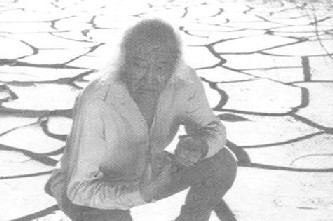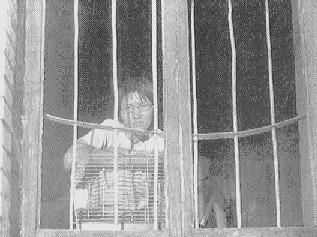

The story of Tilepbergenova's short film is simple: an old, lonely man who captures and sells birds at the market is commissioned to trap a falcon. The film's title, The Hood, literally refers to the small leather hood used to blind the falcon in order to keep it from taking flight. Figuratively, however, it suggests the permanence of the old man's life and his inability to "fly away," so to speak. He, like his birds, is trapped and caged. In a nightmare, the old man sees himself scared and flailing in a desert landscape; that inhospitable setting functions as a metaphor for his own home and general surroundings, in which he is alone. The symbolic link between the man and his birds appears visually: rain water trickles into his leaky home just as it drips into the birds' cages.
A young girl, who compassionately helps the old man home when he is drunk and also brings him milk, seems to be a possible savior. However, ultimately the man refuses her help. The old man throws the little girl out of his house when she suggests taking a bird out of its cage. In doing so, he symbolically reveals his own refusal to leave the solitary confines of his cage.

Dal'mira Tilepbergenova was born in 1967 in the village of Semenovka in Kyrgyzstan. After graduating from the Philological Department of Kyrgyz State University in Bishkek (formerly named Frunze University) in 1989, Tilepbergenova pursued a degree in the Department of Film and TV at the University of Arts.
| 2001 | Tomogo (The Hood) |
| 2002 | Tunguch |